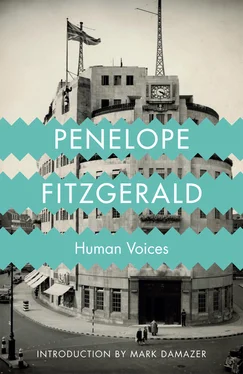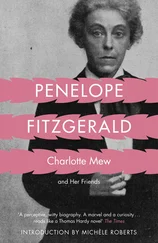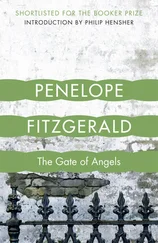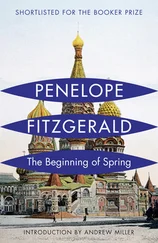PENELOPE FITZGERALD
Cover
Title Page Human Voices PENELOPE FITZGERALD
Preface by Hermione Lee, Advisory Editor
Introduction
1
2
3
4
5
6
7
8
9
10
11
12
Other Works
Copyright
About the Publisher
Preface by Hermione Lee, Advisory Editor
When Penelope Fitzgerald unexpectedly won the Booker Prize with Offshore , in 1979, at the age of sixty-three, she said to her friends: ‘I knew I was an outsider.’ The people she wrote about in her novels and biographies were outsiders, too: misfits, romantic artists, hopeful failures, misunderstood lovers, orphans and oddities. She was drawn to unsettled characters who lived on the edges. She wrote about the vulnerable and the unprivileged, children, women trying to cope on their own, gentle, muddled, unsuccessful men. Her view of the world was that it divided into ‘exterminators’ and ‘exterminatees’. She would say: ‘I am drawn to people who seem to have been born defeated or even profoundly lost.’ She was a humorous writer with a tragic sense of life.
Outsiders in literature were close to her heart, too. She was fond of underrated, idiosyncratic writers with distinctive voices, like the novelist J. L. Carr, or Harold Monro of the Poetry Bookshop, or the remarkable and tragic poet Charlotte Mew. The publisher Virago’s enterprise of bringing neglected women writers back to life appealed to her, and under their imprint she championed the nineteenth-century novelist Margaret Oliphant. She enjoyed eccentrics like Stevie Smith. She liked writers, and people, who stood at an odd angle to the world. The child of an unusual, literary, middle-class English family, she inherited the Evangelical principles of her bishop grandfathers and the qualities of her Knox father and uncles: integrity, austerity, understatement, brilliance and a laconic, wry sense of humour.
She did not expect success, though she knew her own worth. Her writing career was not a usual one. She began publishing late in her life, around sixty, and in twenty years she published nine novels, three biographies and many essays and reviews. She changed publisher four times when she started publishing, before settling with Collins, and she never had an agent to look after her interests, though her publishers mostly became her friends and advocates. She was a dark horse, whose Booker Prize, with her third novel, was a surprise to everyone. But, by the end of her life, she had been short-listed for it several times, had won a number of other British prizes, was a well-known figure on the literary scene, and became famous, at eighty, with the publication of The Blue Flower and its winning, in the United States, the National Book Critics Circle Award.
Yet she always had a quiet reputation. She was a novelist with a passionate following of careful readers, not a big name. She wrote compact, subtle novels. They are funny, but they are also dark. They are eloquent and clear, but also elusive and indirect. They leave a great deal unsaid. Whether she was drawing on the experiences of her own life – working for the BBC in the Blitz, helping to make a go of a small-town Suffolk bookshop, living on a leaky barge on the Thames in the 1960s, teaching children at a stage-school – or, in her last four great novels, going back in time and sometimes out of England to historical periods which she evoked with astonishing authenticity – she created whole worlds with striking economy. Her books inhabit a small space, but seem, magically, to reach out beyond it.
After her death at eighty-three, in 2000, there might have been a danger of this extraordinary voice fading away into silence and neglect. But she has been kept from oblivion by her executors and her admirers. The posthumous publication of her stories, essays and letters is now being followed by a biography ( Penelope Fitzgerald: A Life , by Hermione Lee, Chatto & Windus, 2013), and by these very welcome reissues of her work. The fine writers who have done introductions to these new editions show what a distinguished following she has. I hope that many new readers will now discover, and fall in love with, the work of one of the most spellbinding English novelists of the twentieth century.
Penelope Fitzgerald, brilliant Oxford student and already a clever if unpublished writer, was employed as a BBC features producer at the end of 1940 – the year in which Human Voices is set. She may not have been at the bottom of the pile but neither was she part of an elite graduate corps that the BBC brilliantly recruited and exploited in the last decades of the century.
In 1940 Fitzgerald could hardly have expected anything senior or with real prospects. The BBC had not yet discovered the merits of young female talent. As with almost all areas of public life, it was controlled entirely by men who largely required women to make the tea, do the typing and scurry through its corridors to store, retrieve and organise the material that would ensure the BBC could provide truthful information and a bit of light relief to a nation enduring the impact of the Battle of Britain, the Blitz and the military collapse of its closest ally, France.
If Fitzgerald’s contribution to the BBC’s war effort was marginal she at least had a ringside seat while its mandarins, then as now laden with acronyms, established its reputation as an independent, if imperfect, force for the good by telling the truth – or at least large chunks of it. The BBC had not done nearly as well during the General Strike of 1926, when its first director general, Lord Reith, much preferred the idea of buttressing the government, over any idea of the BBC as a trusted source of information. When Human Voices was published in 1980, at the beginning of the Thatcher era, the BBC still drew much strength and credibility, both at home and abroad, from its performance in World War Two.
Fitzgerald’s view of the wartime BBC is unsparing, but her respect for its achievement is palpable throughout. Her summary of its public service credo may have been a response to the specific events of 1940 but has never been bettered in any subsequent crisis by any historian at any point in the BBC’s history:
Broadcasting House was in fact dedicated to the strangest project of the war, or of any war, that is, telling the truth. Without prompting, the BBC had decided that truth was more important than consolation, and, in the long run, would be more effective.
Her two central male characters, Sam Brooks and Jeff Haggard, are flawed broadcasting heroes. Brooks is head of Recorded Programmes, Haggard the director of Programme Planning. Their professional interests at the BBC are not aligned. Brooks is forever frustrated by having to cede airtime and resources to the needs of live broadcasting, Haggard’s domain. But they share a profound sense of duty: detached and understated in Haggard’s case, obsessive and narcissistic in Brooks’. They also share a pronounced disregard for the pettifogging, very senior managers who get in their way and for any government or military interest bent on turning the BBC into a more conventional state broadcaster. They never talk about the BBC’s independence – the first word the BBC normally uses to defend itself against outside pressure – they simply practise it.
The relationship between these two men, each with largely unexplored marital difficulties, gives the novel much of its shape. They do not go in for verbal intimacy, nor do they have time to socialise and, unlike others in the building, they don’t drink much.
Brooks is attractive, apparently oblivious to the interests of the women who work for him (his ‘seraglio’) and constantly complains, angrily and wittily about those who do not recognise the importance of his work. Haggard is laconic, understated and frequently called in to support his needy and vulnerable friend. He does so with almost terminal reluctance.
Читать дальше












